

Rock n roll arrived upon the wave of R&B with jump blues shouters like Bobby Bland, Roy Brown and Jimmy Witherspoon at its crest. Blues, however, as distinguished from rhythm and blues, are an elemental force in a lot of rock music. When blues artist, Big Bill Broonzy, left rural Arkansas for urban Chicago in 1920 he seeded what would later become known as Chicago blues w such as blues musician, Muddy Waters, leading the way toward an increasing mixture of rock such as in Otis Rush or Eddie Clearwater. In the meantime there were a number of artists more associated with pure blues than R&B or Chicago blues who nevertheless gave early rock a nod of recognition. The roll call compiled below conspicuously absents the singular T-Bone Walker who was elected into the Rock & Roll Hall of fame in 1987 twelve years after his death in 1975.
Muddy Waters (McKinley Morganfield) was born on 4 April 1913 to make his first recordings in 1941 ('Country Blues' and 'I Be's Troubled'). Bridging from blues to Chicago blues, he recorded four songs which were later elected into The Rock and Roll Hall of Fame as among the '500 Songs That Shaped Rock and Roll'. The first was 'Rollin' Stone' of 1950 composed by Waters and after which the Rolling Stones named their band. The next was 'Hoochie Coochie Man' of 1954 composed by Willie Dixon. Come 'Mannish Boy' in 1955 composed by Waters, Mel London and Bo Diddley (Ellas McDaniel). 'Got My Mojo Workin' arrived in 1957, authored by Preston Foster. Waters died on 30 April 1983.
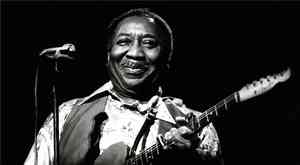
Muddy Waters
Source: Morrison Hotel Gallery
'Rollin' Stone' Composition: Muddy Waters Issued 1950
Harmonica player, Little Walter (Marion Walter Jacobs), was among the first to amplify harmonica, holding the instrument to the microphone. Born on 1 May 1930, 'Ora-nelle Blues' w 'Just Keep Loving Her' were his first releases in 1947 on Ora Nelle 701. The Rolling Stones did a few covers of Walter as recently as 2016: 'Hate to See You Go' (Walter), 'I Got to Go' (Walter) and 'Just Your Fool' (Buddy Johnson). Walters placed 14 tunes in the Top Ten from 1952 to 1958. Titles below reached No.1. Walter was only 37 years old when he during a fight after a performance in Chicago on 15 February 1968.
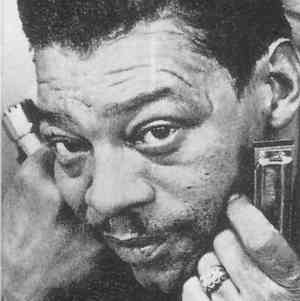
Little Walter
Source: Bon Corretore
'Juke' Composition by Walter 1952
'My Babe' Composition by Willie Dixon 1955
Born on 5 September 1906, pianist, Sunnyland Slim (Albert Luandrew), is thought to have first recorded in 1946 with Jump Jackson. He raised his own band the next year toward its initial issue of 'Illinois Central' with 'Sweet Lucy Blues' on B side in 1947. Luandrew was identified only as "Doc Clayton's Buddy" on his first releases, but assumed the name "Sunnyland Slim" the same year due to frequent performances of a tune called 'Sunnyland Train'. Titles below, composed by Sunnyland, were issued A and B sides of Blue-Lake 107 in 1954. Sunnyland lived to as late as 17 March 1996.
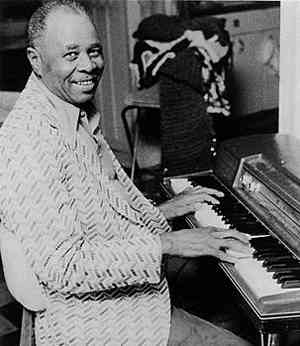
Sunnyland Slim
Source: Mapleshade Records
'Shake It Baby' Composition by Sunnyland Slim issued on Blue-Lake 107 A in 1954
'Bassology' Composition by Sunnyland Slim issued on Blue-Lake 107 B in 1954
Born on 3 September 1915, pianist, Memphis Slim (John Len Chatman), held his initial recording session on 8 August 1940. Among those titles were 'The Jive Blues' and 'Blues at Midnight'. Lord's Disco, which lists only jazz or jazz-relevant titles, traces Slim to 141 sessions during his career, including titles issued on his 1959 album, 'At the Gate of Horn', recorded in Chicago on 18 August. Memphis Slim died on 24 Feb 1988. The album, 'The Paris Sessions', was released posthumously the same year. 'Gotta Find My Baby' below is credited to "Fraser" on record labels. Fraser is L.C. Frazier (Len Chatman), a pseudonym for Memphis Slim [Discogs].
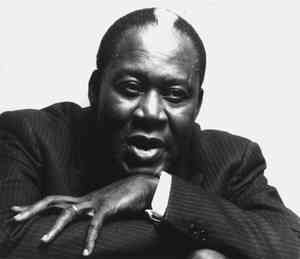
Memphis Slim
Source: Blues Everyday
'Gotta Find My Baby' Composition by Memphis Slim 1958
Elmore James was a rural Delta Blues guitarist born on 27 January 1917. His first recording session is thought to have occurred on 4 January 1951. That was backing Sonny Boy Williamson II (Rice Miller) on 'Eyesight to the Blind' and 'Crazy About You Baby' issued on Trumpet Records 129. On August 5 Williamson supported James on 'Catfish Blues' and 'Dust My Broom' released on Trumpet 146. James was only 45 years of age when he died of heart attack in Chicago on 24 May 1963. He nevertheless influenced several later rock musicians such as Brian Jones (Rolling Stones), Jeremy Spencer (Fleetwood Mac) and Jimi Hendrix.
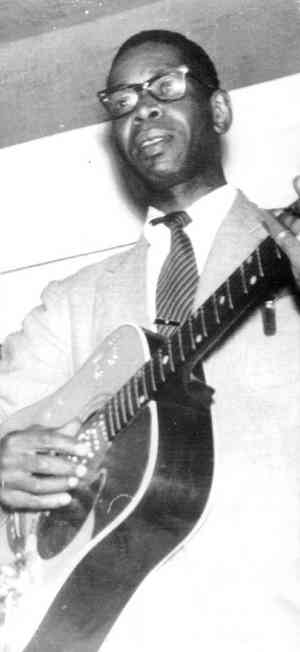
Elmore James
Source: Black & Blue
'Shake Your Money Maker' Composition by Elmore James 1961
Born in White Station, Mississippi, on 10 June 1910, Howlin' Wolf (Chester Arthur Burnett) played both guitar and harmonica. His debut recordings were 'Moanin' at Midnight' and 'How Many More Years' in 1951. Three of Wolf's songs have been elected into The Rock and Roll Hall of Fame as among the '500 Songs That Shaped Rock and Roll': 'Smokestack Lightning' had been composed by Wolf toward issue in 1956. Come Willie Dixon's 'Spoonful' in 1960 prior to Dixon's 'The Red Rooster' in 1962. Wolf passed away on 10 January 1976 at a veteran's hospital in Hines Illinois, of surgical complications over a bad kidney.
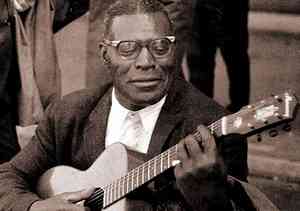
Howlin' Wolf
Source: 10 Mania
'Shake For Me' Composition by Willie Dixon 1964
Other bluesmen with a strong influence on early rock included John Lee Hooker born on 22 August of either 1912 or 1917. Hooker's first recording arrived in 1948 per 'Boogie Chillen'. Later in his career he worked w rock musicians like Canned Heat and Carlos Santana. He is also remembered for his work with guitarist and producer, Ry Cooder. Wolf made it all the way to the new millennium, not dying until until 21 June 2001.
Further Reading:
500 Songs That Shaped Rock and Roll (Rock & Roll Hall of Fame / Jan 2012)
Classical Main Menu Modern Recording
hmrproject (at) aol (dot) com